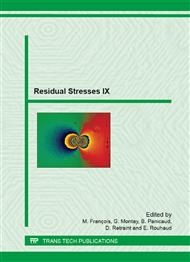p.409
p.417
p.424
p.431
p.439
p.445
p.451
p.457
p.463
Neutron and X-Ray Diffraction Residual Stress Measurements in Aluminium Alloys MIG Welded T-Joints after Friction Stir Processing
Abstract:
Friction Stir Processing (FSP) is a relatively new post-processing technique. Fatigue strength of MIG fillet welds of aluminium alloys can be substantially improved using FSP. Beyond other properties intrinsically tied to fatigue life, especially attention should be paid to the effect of the final residual stress state. In this study the residual stress distribution in T-joints of two aluminium alloys was determined by Neutron and X-ray diffraction. FSP effect on the residual stress state and fatigue life was analysed.
Info:
Periodical:
Pages:
439-444
DOI:
Citation:
Online since:
August 2014
Permissions:
Share:
Citation:


